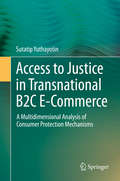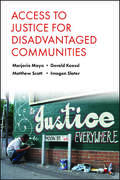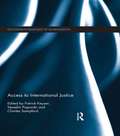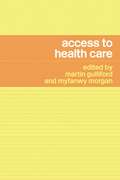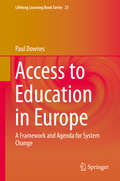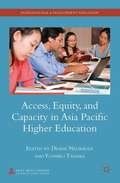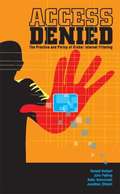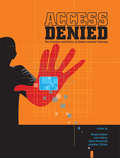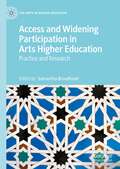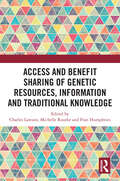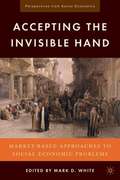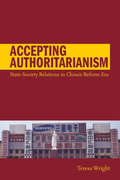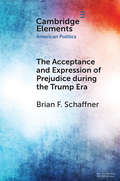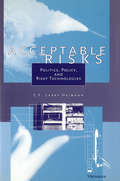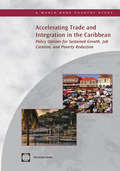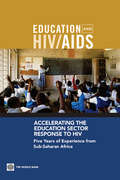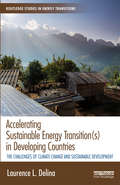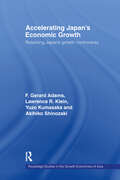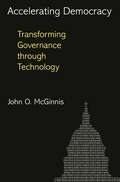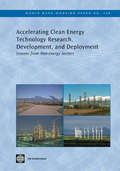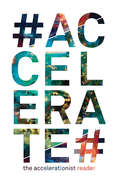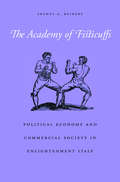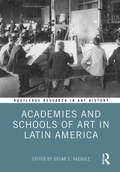- Table View
- List View
Access To Power
by Robert EllisDrawing on his experience as a high-profile media consultant, first-time author Ellis spins a potent political thriller that deftly conveys the superficiality and shrewdness of life on Capitol Hill. When renowned image-maker Frank Miles is hired to wage a no-holds-barred advertising blitz for Mel Merdock, a senatorial candidate with deep pockets and few morals, Frank's primary concern is to win the race, even if his client isn't the best man for the job. Three weeks prior to election day, Frank's longtime business partner and friend, Woody, is murdered during what appears to be a botched robbery. Unable to shake the feeling that Woody's death was no accident and aware of the considerable enemies his sometimes sleazy media schemes have earned him, Frank does some investigating of his own and uncovers a shocking trail of corruption that leads all the way to the White House. Ellis writes in crisp, punchy prose, mirrored by the novel's short, sound bite-like chapters, which are skillfully woven to form an absorbing narrative. A side story involving a romance between Frank and an associate is a pleasing touch, and Ellis's painstaking attention to character development, pacing and detail will ensure that this hard-hitting debut will leave conspiracy buffs hungering for more.
Access to Justice in Transnational B2C E-Commerce: A Multidimensional Analysis of Consumer Protection Mechanisms
by Sutatip YuthayotinThis book identifies institutional mechanisms that can be used to promote consumer confidence in direct online sales with businesses (B2C e-commerce). It argues that enhancing the access to justice in a multidimensional sense can potentially offer an effective means of boosting consumer confidence. It introduces a conceptual framework for a multidimensional approach to access to justice in the context of consumer protection, describing the various reasonable criteria needed to satisfy consumer demands in B2C e-commerce. The framework, which reflects all essential aspects of consumers' expectations when they engage in online transactions, provides a benchmark for the evaluation of various consumer protection mechanisms. Based on an analysis of different mechanisms and using the framework's criteria, the practice of private ordering, which does not rely on the creation of rules of law but rather on the use of technology as a solution, appears to offer a meaningful way to enhance access to justice in B2C e-commerce. However, though private ordering holds considerable potential, certain weaknesses still need to be eliminated. This book demonstrates how private ordering can be successfully implemented with the help of an intermediary, a neutral third party that plays an integral part in the collaborative task of facilitating various aspects of private ordering, thus helping to limit the risks of failure and ensuring a fairer market setting. In order to move forward, it argues that the state, with its wealth of material resources and incentive options, is the institution best suited to acting as an intermediary in facilitating private ordering. This promising proposal can improve consumer protection, which will in turn boost consumer confidence.
Access to Justice for Disadvantaged Communities
by Marjorie MayoAccess to justice for all, regardless of the ability to pay, has been a core democratic value. But this basic human right has come under threat through wider processes of restructuring, with an increasingly market-led approach to the provision of welfare. Professionals and volunteers in Law Centres in Britain are struggling to provide legal advice and access to welfare rights to disadvantaged communities. Drawing upon original research, this unique study explores how strategies to safeguard these vital services might be developed in ways that strengthen rather than undermine the basic ethics and principles of public service provision. The book explores how such strategies might strengthen the position of those who provide, as well as those who need, public services, and ways to empower communities to work more effectively with professionals and progressive organisations in the pursuit of rights and social justice agendas more widely.
Access to International Justice (Challenges of Globalisation)
by Patrick Keyzer Vesselin Popovski Charles SampfordThere is much debate about the scope of international law, its compatibility with individual state practice, its enforceability and the recent and limited degree to which it is institutionalized. This collection of essays seeks to address the issue of access to justice, the related element of domestic rule of law which does not yet figure significantly in debates about international rule of law. Even in cases in which laws are passed, institutions are present and key players are ethically committed to the rule of law, those whom the laws are intended to protect may be unable to secure protection. This is an issue in most domestic jurisdictions but also one which poses severe problems for international justice worldwide. The book will be of interest to academics and practitioners of international law, environmental law, transitional justice, international development, human rights, ethics, international relations and political theory.
Access to Health Care
by Martin Gulliford Myfanwy MorganTo what extent can we have truly universal, comprehensive and timely health services, equally available to all? Access to Health Care considers the meaning of 'access' in health care and examines the theoretical issues that underpin these questions. Contributors draw on a range of disciplinary perspectives to investigate key aspects of access, including:· geographical accessibility of services· socio-economic equity of access· patients' help-seeking behaviour· organisational problems and access· methods for evaluating access.Access is considered in both a UK and international context. The book includes chapters on contrasting health policies in the United States and European Union. Access to Health Care provides both health care researchers as well as health professionals, managers and policy analysts, with a clear and wide-ranging overview of topical and controversial questions in health policy and health services organization and delivery.
Access to Education in Europe: A Framework and Agenda for System Change (Lifelong Learning Book Series #21)
by Paul DownesThis book identifies key elements of an international framework to develop systems-level change to promote access to education, including higher education, for socio-economically marginalized groups. It is based on interviews with senior government officials and senior management in universities, non formal education and prisons across 12 countries in Europe. The book identifies systemic obstacles to and opportunities for promotion of access to education for socio-economically excluded groups that are issues transferable to other countries' contexts. It adopts a systemic focus on access across a range of domains of education, both formal higher education and non-formal education, as well as prison education. Through a focus on a more dynamic structuralist systems framework it develops an innovative post-Bronfenbrennerian view of system levels in lifespan developmental and educational psychology. It also develops an international agenda for reform in relation to these various system levels for access to education for socio-economically marginalized groups, through extraction of key structural indicators to evaluate reform progress in a transparent, culturally sensitive manner. The book identifies current gaps and strengths in policy, practice and structures that impact upon access to education, including higher education, across a range of countries. These gaps and strengths are illustrative and are to inform a strategic approach to system level change and development for the promotion of access to education for socio-economically marginalized groups in Europe and beyond. "Too many educational practices entrench social exclusion: it is an urgent priority across Europe that social justice policies are implemented for the inclusion of marginalised groups. Paul Downes' analysis of these issues is timely. His conclusions are considered and practical: this book is a valuable and constructive resource for practitioners, academics and the policy community. " Professor Alistair Ross, Jean Monnet ad Personam Professor of Citizenship Education in Europe, Emeritus Professor of Education, Institute for Policy Studies in Education, London Metropolitan University
Access, Equity, and Capacity in Asia-Pacific Higher Education
by Deane Neubauer Yoshiro TanakaHigher education is growing most rapidly in the Asia-Pacific region, and policy makers are facing the task of balancing quality and quantity. This book will help readers understand the current situation of higher education not only in this region but everywhere that they may work. ' - Shinichi Yamamoto, Hiroshima University, Japan
Access Denied
by Ronald J. Deibert John G. Palfrey Jonathan Zittrain Rafal RohozinskiMany countries around the world block or filter Internet content, denying access to information--often about politics, but also relating to sexuality, culture, or religion--that they deem too sensitive for ordinary citizens. Access Denied documents and analyzes Internet filtering practices in over three dozen countries, offering the first rigorously conducted study of this accelerating trend. Internet filtering takes place in at least forty states worldwide including many countries in Asia and the Middle East and North Africa. Related Internet content control mechanisms are also in place in Canada, the United States and a cluster of countries in Europe. Drawing on a just-completed survey of global Internet filtering undertaken by the OpenNet Initiative (a collaboration of the Berkman Center for Internet and Society at Harvard Law School, the Citizen Lab at the University of Toronto, the Oxford Internet Institute at Oxford University, and the University of Cambridge) and relying on work by regional experts and an extensive network of researchers, Access Denied examines the political, legal, social, and cultural contexts of Internet filtering in these states from a variety of perspectives. Chapters discuss the mechanisms and politics of Internet filtering, the strengths and limitations of the technology that powers it, the relevance of international law, ethical considerations for corporations that supply states with the tools for blocking and filtering, and the implications of Internet filtering for activist communities that increasingly rely on Internet technologies for communicating their missions. Reports on Internet content regulation in forty different countries follow, with each country profile outlining the types of content blocked by category and documenting key findings. Contributors: Ross Anderson, Malcolm Birdling, Ronald Deibert, Robert Faris, Vesselina Haralampieva, Steven Murdoch, Helmi Noman, John Palfrey, Rafal Rohozinski, Mary Rundle, Nart Villeneuve, Stephanie Wang, and Jonathan Zittrain
Access Denied: The Practice and Policy of Global Internet Filtering (Information Revolution and Global Politics)
by Ronald Deibert John Palfrey Rafal Rohozinski Jonathan ZittrainA study of Internet blocking and filtering around the world: analyses by leading researchers and survey results that document filtering practices in dozens of countries.Many countries around the world block or filter Internet content, denying access to information that they deem too sensitive for ordinary citizens—most often about politics, but sometimes relating to sexuality, culture, or religion. Access Denied documents and analyzes Internet filtering practices in more than three dozen countries, offering the first rigorously conducted study of an accelerating trend. Internet filtering takes place in more than three dozen states worldwide, including many countries in Asia, the Middle East, and North Africa. Related Internet content-control mechanisms are also in place in Canada, the United States and a cluster of countries in Europe. Drawing on a just-completed survey of global Internet filtering undertaken by the OpenNet Initiative (a collaboration of the Berkman Center for Internet and Society at Harvard Law School, the Citizen Lab at the University of Toronto, the Oxford Internet Institute at Oxford University, and the University of Cambridge) and relying on work by regional experts and an extensive network of researchers, Access Denied examines the political, legal, social, and cultural contexts of Internet filtering in these states from a variety of perspectives. Chapters discuss the mechanisms and politics of Internet filtering, the strengths and limitations of the technology that powers it, the relevance of international law, ethical considerations for corporations that supply states with the tools for blocking and filtering, and the implications of Internet filtering for activist communities that increasingly rely on Internet technologies for communicating their missions. Reports on Internet content regulation in forty different countries follow, with each two-page country profile outlining the types of content blocked by category and documenting key findings.ContributorsRoss Anderson, Malcolm Birdling, Ronald Deibert, Robert Faris, Vesselina Haralampieva [as per Rob Faris], Steven Murdoch, Helmi Noman, John Palfrey, Rafal Rohozinski, Mary Rundle, Nart Villeneuve, Stephanie Wang, Jonathan Zittrain
Access and Widening Participation in Arts Higher Education: Practice and Research (The Arts in Higher Education)
by Samantha BroadheadThis volume brings together a range of practitioners, managers, and researchers who work within the field of arts higher education to reflect on strategies to increase access and widening participation (WP). The issues presented in this book are situated within a wider global context where countries are seeking greater harmonisation of higher education as students and workers become more mobile, crossing international borders. The chapter authors address various issues within higher education institutions from a WP context, including areas such as creative writing, music, art and design. In exploring these issues the editor and her chapter authors seek to answer how those teaching in arts higher education can promote the value and quality of their work while ensuring fair access and wide participation for all.
Access and Benefit Sharing of Genetic Resources, Information and Traditional Knowledge
by Charles Lawson, Michelle Rourke and Fran HumphriesAddressing the management of genetic resources, this book offers a new assessment of the contemporary Access and Benefit Sharing (ABS) regime. Debates about ABS have moved on. The initial focus on the legal obligations established by international agreements like the United Nations Convention on Biological Diversity and the form of obligations for collecting physical biological materials have now shifted into a far more complex series of disputes and challenges about the ways ABS should be implemented and enforced. These now cover a wide range of issues, including: digital sequence information, the repatriation of resources, technology transfer, traditional knowledge and cultural expressions, open access to information and knowledge, naming conventions, farmers’ rights, new schemes for accessing pandemic viruses sharing DNA sequences, and so on. Drawing together perspectives from an interdisciplinary range of leading and emerging international scholars, this book offers a new approach to the ABS landscape; as it breaks from the standard regulatory analyses in order to explore alternative solutions to the intractable issues for the Access and Benefit Sharing of genetic resources. Addressing these modern legal debates from a perspective that will appeal to both ABS scholars and those with broader legal concerns in the areas of intellectual property, food, governance, Indigenous issues, and so on, this book will be a useful resource for scholars and students as well as those in government and in international institutions working in relevant areas.
Accepting the Invisible Hand
by Mark D. WhiteThis collection of essays by prominent economists and philosophers showcases the important contributions that markets can make to important topics within social economics, including practical issues such as poverty and disaster relief, as well as more general concerns regarding ethics and well-being.
Accepting Authoritarianism: State-society Relations in China's Reform Era
by Teresa WrightWhy hasn't the emergence of capitalism led China's citizenry to press for liberal democratic change? This book argues that China's combination of state-led development, late industrialization, and socialist legacies have affected popular perceptions of socioeconomic mobility, economic dependence on the state, and political options, giving citizens incentives to perpetuate the political status quo and disincentives to embrace liberal democratic change. Wright addresses the ways in which China's political and economic development shares broader features of state-led late industrialization and post-socialist transformation with countries as diverse as Mexico, India, Tunisia, Indonesia, South Korea, Brazil, Russia, and Vietnam. With its detailed analysis of China's major socioeconomic groups (private entrepreneurs, state sector workers, private sector workers, professionals and students, and farmers),Accepting Authoritarianismis an up-to-date, comprehensive, and coherent text on the evolution of state-society relations in reform-era China.
The Acceptance and Expression of Prejudice during the Trump Era (Elements in American Politics)
by Brian F. SchaffnerWhat are the consequences when politicians make prejudiced statements? Theories about the suppression of prejudice argue that people are likely to express more prejudice when they believe that norms are more permissive than they may have otherwise assumed. Using a series of experiments carried out during and since the 2016 campaign, Brian Schaffner shows that being exposed to Donald Trump's prejudiced rhetoric causes people to express more prejudice themselves. Notably, this is not merely a 'Trump Effect;' people's commitment to anti-prejudice norms is undermined even when exposed to prejudiced rhetoric attributed to unnamed politicians. These findings are consequential; if politicians increasingly feel at liberty to express explicit prejudice, then the mass public is likely to take cues from such behavior, leading them to express more prejudice themselves. This may lead to increasingly heightened inter-group tensions which could pose a threat to political and social stability in the United States.
Acceptable Risks
by C. F. Larry HeimannComplex and risky technologies--technologies such as new drugs for the treatment of AIDS that promise great benefits to our society but carry significant risks--pose many problems for political leaders and the policy makers responsible for overseeing them. Public agencies such as the Food and Drug Administration are told by political superiors not to inhibit important technological advances and may even be charged with promoting such development but must also make sure that no major accidents occur under their watch. Given the large costs associated with catastrophic accidents, the general public and elected officials often demand reliable or failure-free management of these technologies and have little tolerance for the error. Research in this area has lead to a schism between those who argue that it is possible to have reliable management techniques and safely manage complex technologies and others who contend that such control is difficult at best. In this book C. F. Larry Heimann advances an important solution to this problem by developing a general theory of organizational reliability and agency decision making. The book looks at both external and internal influences on reliability in agency decision making. It then tests theoretical propositions developed in a comparative case study of two agencies involved with the handling of risky technologies: NASA and the manned space flight program and the FDA's handling of pharmaceuticals--particularly new AIDS therapies. Drawing on concepts from engineering, organizational theory, political science, and decision theory, this book will be of interest to those interested in science and technology policy, bureaucratic management and reform, as well as those interested in health and space policy. C. F. Larry Heimann is Assistant Professor of Political Science, Michigan State University.
Accelerating Trade and Integration in the Caribbean: Policy Options for Sustained Growth, Job Creation, and Poverty Reduction
by World BankThe main objective of this report is to help policymakers in the Caribbean design an agenda of policy actions to accelerate trade integration and growth and reduce poverty. The report is a joint response from the World Bank and the Organization of American States (OAS) to a demand statement from the member states of CARICOM, formulated by the Caribbean Regional Negotiating Machinery and the CARICOM Secretariat, to strengthen the analytical underpinnings of the linkages between trade, economic growth, and poverty. It aims at centering the Caribbean's next round of trade reforms and its overall agenda around trade on these key thematic areas. The report provides an overview of the economic and trade system context of the Caribbean, under which the new trade environment is operating. It then discusses the opportunities and challenges for the Caribbean associated with the new trade environment. It finally quantifies the gains from global trade integration using a dynamic macroeconomic analysis. The report provides policy priorities to accelerating Caribbean integration into the world economy and to reap the benefits of global competition. Each part of the report focuses on a key question and adds value by providing an in-depth analysis of the issues raised and laying the foundations for policy recommendations described in the last chapter of the report: * Part I (Overview of economic and trade system context): is Caribbean's economic and trade system sound enough to sustain the new era of its global trade relations which is being shaped? * Part II (Focuses on the analysis of the new opportunities and challenges of the new trade environment): what are the opportunities and challenges that the new trade environment offers to the Caribbean? * Part III (Presents an assessment of the impact of the EPA on growth and poverty using two types of macroeconomic models): what are the gains in terms of growth and poverty reduction of the recently negotiated EPA?
Accelerating the Education Sector Response to HIV
by Donald Bundy Anthi Patrikios Lesley Drake Changu Mannathoko Stella Manda Bachir Sarr Andy TembonThe education sector plays a key "external" role in preventing and reducing the stigma surrounding HIV/AIDS. It also plays an important "internal" role in providing access to care, treatment, and support for teachers and education staff, a group that in many countries represents more than 60 percent of the public sector workforce. The education sector can also have a critically important positive effect on the future: Even in the worst-affected countries, most schoolchildren are not infected. For these children, there is a chance to live lives free from AIDS if they can be educated on the knowledge and values that can protect them as they grow up. The authors of 'Accelerating the Education Sector Response to HIV' explore the experiences of education sectors across Sub-Saharan Africa as they scale up their responses to HIV/AIDS within the Accelerate Initiative Working Group, established in 2002 by the Joint United Nations Programme on HIV/AIDS (UNAIDS) Inter-Agency Task Team on Education. This book demonstrates that leadership by the ministries of education and commitment from key development partners are crucial for mobilizing activities and that full participation of all stakeholders is required for effective implementation. This book summarizes the experiences of technical Focal Points from the 37 ministries of education in Sub-Saharan Africa, which are represented on the sub-regional networks for HIV and Education. These experiences prove that the education sector response can play a crucially important role in the multisectoral national responses to this epidemic.
Accelerating Sustainable Energy Transition: The challenges of climate change and sustainable development (Routledge Studies in Energy Transitions)
by Laurence L DelinaAccelerating sustainable energy transitions away from carbon-based fuel sources needs to be high on the agendas of developing countries. It is key in achieving their climate mitigation promises and sustainable energy development objectives. To bring about rapid transitions, simultaneous turns are imperative in hardware deployment, policy improvements, financing innovation, and institutional strengthening. These systematic turns, however, incur tensions when considering the multiple options available and the disruptions of entrenched power across pockets of transition innovations. These heterogeneous contradictions and their trade-offs, and uncertainties and risks have to be systematically recognized, understood, and weighed when making decisions. This book explores how the transitions occur in fourteen developing countries and broadly surveys their technological, policy, financing, and institutional capacities in response to the three key aspects of energy transitions: achieving universal energy access, harvesting energy efficiency, and deploying renewable energy. The book shows how fragmented these approaches are, how they occur across multiple levels of governance, and how policy, financing, and institutional turns could occur in these complex settings. This book will be of interest to students and scholars of energy and climate policy, development studies, international relations, politics, strategic studies, and geography. It is also useful to policymakers and development practitioners.
Accelerating Japan's Economic Growth: Resolving Japan's Growth Controversy (Routledge Studies in the Growth Economies of Asia)
by Lawrence R. Klein F. Gerard Adams Kumasaka Yuzo Shinozaki AkihikoThe Japanese economy is beginning to show signs of recovery after years of stagnation/deflation, but many Japanese policymakers warn that this economic growth may be sluggish: slower than in the United States and certainly slower than in other East Asian countries. Japan faces significant economic problems, including an aging population, a large fiscal deficit, and the need to adjust to the IT economy and to competition with the rest of East Asia. A slow growth scenario would greatly reduce opportunities for new productive investment and would make it increasingly difficult to provide for Japan's growing social needs. The authors of this book argue that Japan can and should grow more rapidly, and examine the reasons for the sluggish performance of the Japanese economy. For example, some Japanese economic sectors, particularly in distribution and finance, have failed to take advantage of new information and communications technology to accelerate the growth of productivity, as has happened in other countries, such as the US. Production function studies and econometric model simulations suggest that with appropriate policies the Japanese economy can grow more rapidly and deal with its future problems. The book posits a number of policy proposals which would help to accelerate Japan's economic growth This book will be of interest to students of the Japanese economy, macroeconomics and international economies, and also to policymakers and professionals interested in Japan’s economy.
Accelerating Democracy: Transforming Governance Through Technology
by John O. McGinnisHow to adapt democracy to the accelerating pace of technological change—and why it's critical that we doSuccessful democracies throughout history—from ancient Athens to Britain on the cusp of the industrial age—have used the technology of their time to gather information for better governance. Our challenge is no different today, but it is more urgent because the accelerating pace of technological change creates potentially enormous dangers as well as benefits. Accelerating Democracy shows how to adapt democracy to new information technologies that can enhance political decision making and enable us to navigate the social rapids ahead.John O. McGinnis demonstrates how these new technologies combine to address a problem as old as democracy itself--how to help citizens better evaluate the consequences of their political choices. As society became more complex in the nineteenth century, social planning became a top-down enterprise delegated to experts and bureaucrats. Today, technology increasingly permits information to bubble up from below and filter through more dispersed and competitive sources. McGinnis explains how to use fast-evolving information technologies to more effectively analyze past public policy, bring unprecedented intensity of scrutiny to current policy proposals, and more accurately predict the results of future policy. But he argues that we can do so only if government keeps pace with technological change. For instance, it must revive federalism to permit different jurisdictions to test different policies so that their results can be evaluated, and it must legalize information markets to permit people to bet on what the consequences of a policy will be even before that policy is implemented.Accelerating Democracy reveals how we can achieve a democracy that is informed by expertise and social-scientific knowledge while shedding the arrogance and insularity of a technocracy.
Accelerating Clean Energy Technology Research, Development, and Deployment
by Jonathan Coony Patrick AvatoClimate change is one of the key challenges of this century. At the same time, energy use-the primary source of climate-altering global greenhouse gas emissions-is increasing at unprecedented rates and is vital to the continued economic growth of developing countries. This poses a serious dilemma that can only be reconciled with new and improved clean energy technologies that balance climate change mitigation and increased energy needs in developing countries. Despite a recent increase in investment, public and private research, development, and deployment (RD&D) funding rates are well below historical levels. In addition, significant barriers impede the ability to develop new technologies, such as the uncertain future value of CO2 emissions, intellectual property rights issues, limited incentives to commercialize technologies for developing countries, and challenges with technology transfer. These factors must be overcome to accelerate innovation in the energy sector. To introduce new thinking to address these concerns, this report examines four cases from outside the energy sector where creative approaches to RD&D have successfully overcome similar barriers. The case studies review approaches to innovation by the Consultative Group on International Agricultural Research, Advanced Market Commitments for Vaccines, the Human Genome Project, and the concept of Distributed Innovation. These case studies show how creative efforts can generate valuable public goods via: (i) international partnerships between public and private actors, (ii) information sharing and intellectual property rights, and (iii) novel financing schemes.
#Accelerate: The Accelerationist Reader
by Robin Mackay Armen AvanessianAn apparently contradictory yet radically urgent collection of texts tracing the genealogy of a controversial current in contemporary philosophy.Accelerationism is the name of a contemporary political heresy: the insistence that the only radical political response to capitalism is not to protest, disrupt, critique, or détourne it, but to accelerate and exacerbate its uprooting, alienating, decoding, abstractive tendencies.#Accelerate presents a genealogy of accelerationism, tracking the impulse through 90s UK darkside cyberculture and the theory-fictions of Nick Land, Sadie Plant, Iain Grant, and CCRU, across the cultural underground of the 80s (rave, acid house, SF cinema) and back to its sources in delirious post-68 ferment, in texts whose searing nihilistic jouissance would later be disavowed by their authors and the marxist and academic establishment alike.On either side of this central sequence, the book includes texts by Marx that call attention to his own “Prometheanism,” and key works from recent years document the recent extraordinary emergence of new accelerationisms steeled against the onslaughts of neoliberal capitalist realism, and retooled for the twenty-first century.At the forefront of the energetic contemporary debate around this disputed, problematic term, #Accelerate activates a historical conversation about futurality, technology, politics, enjoyment, and capital. This is a legacy shot through with contradictions, yet urgently galvanized today by the poverty of “reasonable” contemporary political alternatives.
The Academy of Fisticuffs: Political Economy and Commercial Society in Enlightenment Italy
by Sophus A. ReinertThe Italian Enlightenment, no less than the Scottish, was central to the emergence of political economy and creation of market societies. Sophus Reinert turns to Milan in the late 1700s to recover early socialists’ preoccupations with the often lethal tension among states, markets, and human welfare, and the policies these ideas informed.
Academ's Fury (Codex Alera #2)
by Jim ButcherIn Furies of Calderon, #1 New York Times bestselling author Jim Butcher introduced readers to a world where the forces of nature take physical form. But now, it is human nature that threatens to throw the realm into chaos. <P>For centuries, the people of Alera have harnessed the furies—elementals of earth, air, fire, water, wood, and metal—to protect their land from aggressors. But no fury can save them from the dangers they face within. A mysterious attack from across the sea has weakened the First Lord. Should he fall, a bloody civil war is inevitable. The responsibility of fending off assassination attempts and treachery within the First Lord’s circle of spies falls on Tavi, the one man with no fury to call.
Academies and Schools of Art in Latin America (Routledge Research in Art History)
by Oscar E. VázquezThis edited volume’s chief aim is to bring together, in an English-language source, the principal histories and narratives of some of the most significant academies and national schools of art in South America, Mexico, and the Caribbean, from the late 18th to the early 20th centuries. The book highlights not only issues shared by Latin American academies of art but also those that differentiate them from their European counterparts. Authors examine issues including statutes, the influence of workshops and guilds, the importance of patronage, discourses of race and ethnicity in visual pedagogy, and European models versus the quest for national schools. It also offers first-time English translations of many foundational documents from several significant academies and schools. This book will be of interest to scholars in art history, Latin American and Hispanic studies, and modern visual cultures.

